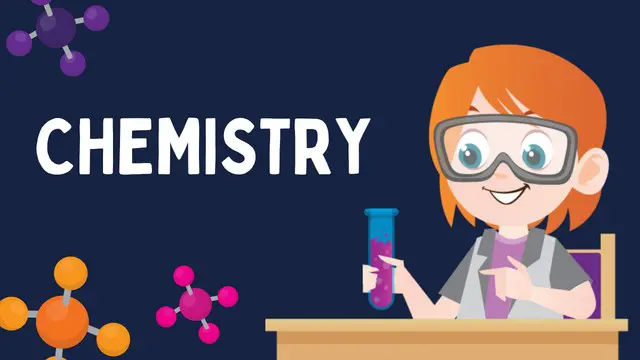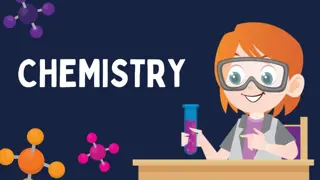
Chemistry Advanced Diploma
CPD Certified| Free PDF Certificate | Lifetime Access | Learner Support | No Hidden Fees | 100% Success Rate
EDURISE
Summary
- Certificate of completion - Free
- Reed courses certificate of completion - Free
- Tutor is available to students
Add to basket or enquire
Overview
Explore the Fascinating World of Chemistry with Our Masterclass
Are you ready to delve into the captivating realm of Chemistry, uncovering its secrets and applications for business and career success? Our Chemistry Masterclass is designed to empower individuals like you with comprehensive knowledge, bringing chemistry's marvels to the forefront.
Why Chemistry Matters in Business and Career:
In the modern world, the role of chemistry extends far beyond the laboratory. Understanding the fundamental principles of chemistry can be a game-changer for your career and business ventures. Here's why:
Innovation and Product Development: Chemistry is the cornerstone of innovation in countless industries. From pharmaceuticals to cosmetics, understanding the chemical processes behind product development is a business imperative.
Environmental Sustainability: Businesses are under increasing pressure to adopt eco-friendly practices. Knowledge of chemistry is vital in developing sustainable products and processes.
Health and Safety: In fields such as healthcare and manufacturing, a sound grasp of chemistry is crucial for ensuring safety and regulatory compliance.
Problem Solving: The ability to analyze and solve complex problems is a highly valuable skill in today's job market. Chemistry equips you with these analytical capabilities.
Data Analysis: Chemistry provides a foundation for data-driven decision-making, a key aspect of many careers.
Our Comprehensive Curriculum:
This Chemistry Masterclass is meticulously crafted to provide you with the depth and breadth of knowledge you need. Our curriculum is data-driven and business-oriented, designed to align with the demands of today's job market. Here's a glimpse of what you will learn:
Module 1: Fundamental Concepts: Lay the groundwork with an exploration of atomic structure, the periodic table, and chemical bonding.
Module 2: Chemical Reactions: Understand the principles behind chemical reactions and their applications in various industries.
Module 3: Organic Chemistry: Delve into the world of carbon compounds, essential in fields like pharmaceuticals and manufacturing.
Module 4: Analytical Chemistry: Learn about techniques for chemical analysis and how they are employed in real-world scenarios.
Module 5: Biochemistry: Explore the chemistry of living organisms, a vital area in healthcare and biotechnology.
Module 6: Environmental Chemistry: Understand the chemical aspects of environmental issues and sustainable practices.
Module 7: Chemistry in Industry: Discover how chemistry drives innovation and product development in various industries.
Module 8: Data Interpretation: Learn how to analyze and derive insights from chemical data, a valuable skill in modern business and research.
Our Chemistry Masterclass is tailored to provide you with a robust understanding of the subject, its real-world applications, and its potential impact on your business and career. Enroll now to uncover the power of chemistry!
Please note that our course does not focus on practical skills, recognized certificates, or regulated qualifications, as it is geared toward providing knowledge and insights for business and career enhancement.
Free Gift
- Course Completion PDF Certificate
- Tutor Support
- Free Session with professionals
Curriculum
Course media
Description
Learning Outcomes for Our Chemistry Curriculum:
Module 01: Fundamentals of Basic Chemistry
- Understanding the Basics: Gain a foundational understanding of chemistry, including key concepts and terminology.
- Chemical Classification: Explore different categories of matter and the elements that compose them.
- Chemical Equations: Learn to interpret and write basic chemical equations.
Module 02: All about Matter
- States of Matter: Investigate the properties and transitions of solids, liquids, and gases.
- Phase Diagrams: Understand how phase changes occur and the factors affecting them.
- Matter in Daily Life: Recognize the importance of matter in everyday scenarios.
Module 03: All about Atoms
- Atomic Structure: Explore the structure of atoms, including subatomic particles.
- Atomic Models: Learn about the historical development of atomic models and their significance.
- Isotopes and Atomic Mass: Grasp the concept of isotopes and their impact on atomic mass.
Module 04: Concept of Chemical Bonding
- Chemical Bonds: Understand how and why atoms form bonds.
- Types of Bonds: Explore ionic, covalent, and metallic bonds and their applications.
- Lewis Structures: Learn to draw Lewis structures for simple molecules.
Module 05: Periodic Table
- Organization of Elements: Examine the layout and organization of elements in the periodic table.
- Periods and Groups: Understand the significance of periods and groups in the periodic table.
- Trends and Properties: Analyze trends in elemental properties across the periodic table.
Module 6: Name Reactions of Organic Chemistry
- Key Organic Reactions: Explore significant organic reactions and their mechanisms.
- Functional Groups: Understand the role of functional groups in organic chemistry.
- Reaction Pathways: Follow the pathways of chemical transformations in organic compounds.
Module 07: Concept of Acids and Bases
- Defining Acids and Bases: Learn what characterizes substances as acids or bases.
- pH and Ionization: Understand pH scales and the ionization of water.
- Acid-Base Reactions: Explore chemical reactions involving acids and bases.
Module 8: Thermochemistry
- Energy Changes in Reactions: Learn about heat, enthalpy, and their significance in chemical reactions.
- Calorimetry: Understand how to measure heat changes in chemical processes.
- Enthalpy Changes: Calculate enthalpy changes for reactions and understand their implications.
Module 9: Chemical Kinetics
- Rate of Reactions: Explore factors affecting the speed of chemical reactions.
- Reaction Mechanisms: Understand the steps and mechanisms involved in complex reactions.
- Catalysts and Inhibitors: Learn about catalysts that enhance reactions and inhibitors that slow them down.
Our chemistry curriculum provides a comprehensive understanding of the subject, covering essential knowledge and concepts without focusing on practical skills or recognized certificates. It's designed to equip you with a strong foundation in chemistry, enabling you to grasp its significance in various domains.
Certificate of Completion
After completing the Chemistry diploma course, you will be able to obtain your free PDF certificate of course completion.
Who is this course for?
Ideal Audience for the Chemistry Curriculum:
High School and College Students: This curriculum is suitable for high school and college students studying chemistry as part of their academic coursework. It provides a strong foundation in fundamental chemistry concepts.
Pre-College Chemistry Enthusiasts: Individuals with a keen interest in chemistry who want to prepare themselves for college-level chemistry courses can benefit from this curriculum.
Science and Engineering Students: Students pursuing degrees in various scientific and engineering fields can use this curriculum to bolster their understanding of chemistry, which is often a fundamental component of their studies.
General Chemistry Enthusiasts: Anyone interested in learning the basics of chemistry for personal enrichment or to better understand the world around them will find value in this curriculum.
Chemistry Educators: Teachers and educators seeking comprehensive content for their chemistry classes can use this curriculum as a teaching resource.
Science Communicators: Individuals involved in science communication, such as science journalists and bloggers, can use this curriculum to enhance their knowledge of chemistry and explain scientific concepts to the general public.
Homeschooling Parents: Parents who homeschool their children and want to provide a structured chemistry curriculum can find this resource useful.
Entry-Level Science and Laboratory Technicians: Individuals beginning their careers in laboratories or scientific research can refresh their understanding of basic chemistry principles using this curriculum.
Adult Learners: Lifelong learners with a curiosity about science can explore the world of chemistry without the need for practical skills or professional qualifications.
Chemistry Enthusiasts with Non-Academic Goals: Those interested in chemistry as a hobby or for personal interest can use this curriculum to deepen their knowledge without pursuing practical applications.
This curriculum caters to a diverse audience, providing a foundational understanding of chemistry that can be applied to various educational and personal enrichment goals. It doesn't focus on practical skills or certificates, making it accessible to a wide range of learners.
Requirements
The Chemistry course has no formal entry requirements. However, to study the Chemistry course students must:
Have passion for virtual learning
Have a good understanding of English, as well as numeracy and IT skills
Have a desire for Chemistry topic
Be over the age of 16
Career path
- Laboratory Technician: Entry-level position with a typical UK salary ranging from £18,000 to £26,000 per year.
- Chemist or Research Scientist: With experience and qualifications, salary can advance to between £27,000 and £50,000 annually.
- Senior Chemist or Principal Investigator: Experienced professionals in these roles may earn £51,000 to £80,000
Questions and answers
Currently there are no Q&As for this course. Be the first to ask a question.
Certificates
Certificate of completion
Digital certificate - Included
Reed courses certificate of completion
Digital certificate - Included
Will be downloadable when all lectures have been completed
Reviews
Currently there are no reviews for this course. Be the first to leave a review.
Legal information
This course is advertised on reed.co.uk by the Course Provider, whose terms and conditions apply. Purchases are made directly from the Course Provider, and as such, content and materials are supplied by the Course Provider directly. Reed is acting as agent and not reseller in relation to this course. Reed's only responsibility is to facilitate your payment for the course. It is your responsibility to review and agree to the Course Provider's terms and conditions and satisfy yourself as to the suitability of the course you intend to purchase. Reed will not have any responsibility for the content of the course and/or associated materials.


